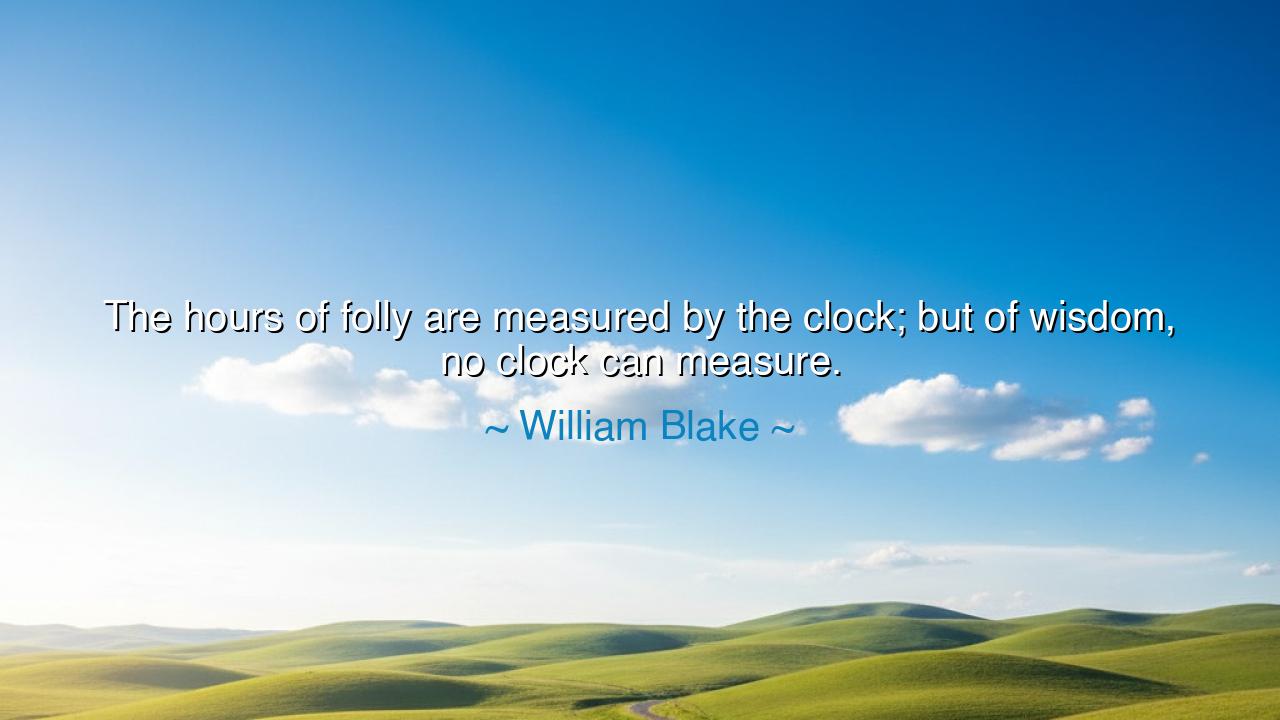
The hours of folly are measured by the clock; but of wisdom, no






Hearken, O children of eternity, to the words of William Blake, who reveals a truth both subtle and profound: that the hours of folly may be counted, measured by the rigid hands of the clock, yet the hours of wisdom elude all reckoning. In folly, time is mundane, bounded, and observable, marked by trivialities and fleeting pleasures. In wisdom, however, the spirit enters a realm beyond measure, where moments expand into understanding and insight, and the soul dances in the infinity of knowing.
Blake’s insight teaches that wisdom cannot be constrained by external devices, nor can its depth be quantified by earthly standards. The pursuits of the unwise are transient, each hour passing as a shadow across the wall, observable, limited, and ultimately forgettable. But the life of reflection, contemplation, and discernment stretches time itself, for in seeking truth, the mind touches the eternal. Knowledge, once grasped, cannot be reduced to hours or minutes; it is timeless, enduring, and immeasurable.
Consider the example of Leonardo da Vinci, who labored ceaselessly in pursuit of understanding the world. His hours of study, observation, and experiment were not measured in mere increments, but in the accumulation of wisdom that transcended the ordinary march of time. The inventions he imagined, the art he created, and the insights he left behind were not bound by the clock, but were manifestations of a mind attuned to the infinite rhythm of learning and discovery.
Blake also hints at the contrast between folly and wisdom as a moral compass. The follies of man—idle gossip, trivial disputes, and the pursuit of ephemeral pleasure—are confined and fleeting. Yet those who cultivate wisdom, who seek understanding, compassion, and truth, dwell in a realm where time itself bends to the depth of thought. Their hours are not lost, for each moment of insight enriches the spirit and leaves an indelible mark upon eternity.
O children of the future, carry this teaching in your hearts: do not measure your life by the mere passing of hours, nor allow the clock to define the worth of your days. Seek the moments in which the mind soars, where reflection, learning, and the pursuit of understanding make time irrelevant. In these hours, you touch the eternal, and in the cultivation of wisdom, your life becomes a beacon across generations.
If you desire, I can also craft a visual, ancient scroll-style layout of this passage to capture the heroic, timeless essence of Blake’s meditation on folly, time, and wisdom.






BAVu Bao Anh
From a reader’s perspective, this line captures the paradox of human experience—time governs our mistakes, but not our understanding. Wisdom can arrive in a second of realization or through years of reflection, and yet neither can be quantified. It makes me wonder if Blake viewed wisdom as a divine gift rather than a human achievement. Perhaps he’s saying that insight, unlike folly, belongs to eternity, not the ticking of a clock.
UGUser Google
This quote makes me reflect on how wisdom feels intangible compared to folly. Foolishness leaves visible traces—wasted time, regret, consequences—but wisdom often manifests quietly, in peace of mind or moral clarity. Maybe that’s why we struggle to recognize wisdom in ourselves until much later. Do you think wisdom can ever be taught directly, or must it always be discovered through the slow, unmeasurable process of living?
PNPhuong Nguyen
Reading this, I’m struck by how Blake separates wisdom from measurable experience. It’s as if wisdom exists in a different dimension altogether—beyond deadlines, progress, or achievement. In our world obsessed with productivity and efficiency, this feels revolutionary. How can we cultivate a mindset that values reflection and understanding more than speed and output? Maybe Blake is reminding us that wisdom isn’t about doing more, but about perceiving more deeply.
PNthanh phong nguyen
I find this statement poetic and profound. It seems to contrast the fleeting nature of folly with the eternal quality of wisdom. Time can expose foolishness, but wisdom seems to stand outside of it, almost like a spiritual constant. I wonder if Blake was suggesting that wisdom connects us to something divine, something unbound by human constructs. Could that be why acts of true insight often feel timeless and infinite?
NHNguyen Hang
This quote makes me think about how wisdom exists beyond the limitations of time. Foolish actions can be counted in moments or mistakes, but wisdom feels timeless—its effects stretch across lifetimes. Maybe Blake meant that true understanding transcends measurement because it belongs to the soul, not the clock. Do you think wisdom is something we can consciously achieve, or does it emerge naturally as we move through different experiences?